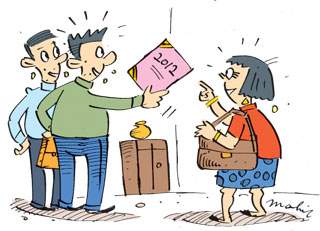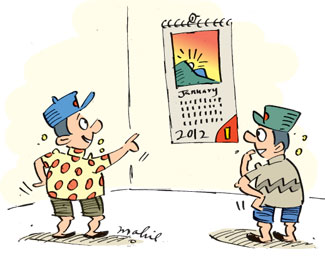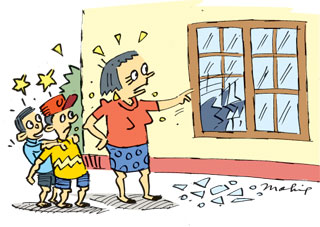|

by R. S. Karunaratne
Possessive adjectives and pronouns
We use possessive adjectives together with a noun. A possessive
pronoun takes the place of a possessive adjective and its noun.
Possessive adjectives and possessive pronouns are used to show ownership
or relationship. The personal pronoun Ďití does not have a possessive
pronoun form.
Personal pronouns:
I, me
We, us
You, you
|

This is his new diary for 2012. |
He, him
She, her
It
They, them
Possessive adjectives:
my,
our,
your,
his,
her,
its,
their
Possessive pronouns:
mine,
ours,
yours,
his,
hers,
theirs
Use
of personal pronouns:
I am a student.
Father gave me a lift to school.
We are not alone in the universe.
They gave us a warm welcome.
You have to wait till I come.
What did he give you?
He is our mathematics teacher.
We invited him to attend our
|

It is a new calendar. |
sports meet.
She is a dancer of repute.
Can I meet her?
it is a new calendar.
They are walking to school.
Who gave them pocket money?
Possessive adjectives:
I lost my purse.
We are going to collect our annual reports.
Have you done your homework?
This is his new diary for 2012.
Her performance was well received.
The dog wags its tail.
Where are their parents?
Possessive pronouns :
This is my bag. It is mine .
These are our books. They are ours .
This is your house. It is yours .
This is his pen. It is his .
It is her book. It is hers .
These are your books. They are yours .
Note :
We do not use the word Ďoneí after a possessive adjective.
Donít say: This pen is his one.
Say: This is his.
When we use a possessive pronoun we do not have to repeat a noun.
Donít say: Your shirt is like my shirt.
Say: Your shirt is like mine.
We do not use an apostrophe (Ď) with a possessive adjective or a
possessive pronoun.
Donít say: This is theirís house.
Say: This is their house.
Activity :
Underline the correct words given in brackets and check your answers
with the key.
1. This car is (heís, her, his).
2. The tree across the road is (mines, mine, my one).
3. The students will hand over (their, theirís, they) answer scripts
now.
4. The fox carried the cockerel in (itís, its, it) mouth.
5. A famous Indian actor is visiting (our, ours, us) school today.
6. I do not like (herís, hers, her) dress.
7. Tissa draws (his, her, him) cartoons with a pencil.
8. Are these gold bracelets (your, yours, yourís)?
9. Your computer is better than (my one, mine, my).
10. Your project report is more interesting than (mine, my one, my).
[Key]
1. his 2. mine 3. their 4. its 5. our 6. her 7. his 8. yours 9. mine
10 mine
Confusable words
While learning English it is necessary to learn how to avoid
confusables and communicate with clarity. Pay attention to the following
words and learn how to use them correctly.
1. Affection / affectation
Affection means fondness or attachment. Affectation is a pretence.
2. Ageing / aging
Both spellings are acceptable in British English.
However,traditionalists still prefer ageing to aging.
3. Common singular / plural confusables
Singular
Plural
Bacterium
Bacteria
Criterion
Criteria
Graffito
Graffiti
Medium
Media
Munutia
Minutiae
Phenomenon
Phenomena
Species
Species
Spectrum
Spectra
Stratum
Strata
4. Aid / abet
Both words mean Ďto assistí. However, abet means Ďto encourage a
criminal act.í Lawyers still use aid and abet which amounts to legal
tautology.
Starters:
Regular and irregular verbs
Regular verbs can be easily identified because the past simple and
past participle end in '-ed'.
Shyama cleaned her shoes before going to school.
Mahes studied medicine at Kelaniya University.
Srima washed her hands as they were dirty.
It rained a lot last night.
Have you finished writing your essay?
Anne learned driving when she was 20.
|

Who broke this window? |
Irregular verbs do not end in '-ed' when we want to form the past
simple and the past participle.
Martha made a cake for Christmas.
Who broke this window?
Jaya slept very well last night.
We saw Titanic yesterday.
I've lost my purse.
Tharindu's bicycle was stolen yesterday.
I went to bed early last night because I was tired.
These houses were built by the government.
Yesterday Dasa fell off his bicycle.
Try to remember the simple past and the past participle of irregular
verbs.
Here are some of the irregular verbs followed by the simple past and
the past participle.
Beat - beat - beaten
Become - became - become
Begin - began - begun
Bite - bit - bitten
Blow - blew - blown
Break - broke - broken
Bring - brought - brought
Build - built - built
Buy - bought - bought
Catch - caught - caught
Choose - chose - chosen
Come - came - come
Cost - cost - cost
Cut - cut - cut
Do - did - done
Draw - drew - drawn
Drink - drank - drunk
Activity:
Fill in blanks with the simple past or the past participle. Check
your answers with the key.
1. Drive - drove - ................
2. Eat - ................. - eaten
3. Fall - fell - .....................
4. Feel - ..................... - felt
5. Fight - fought - ..................
6. Find - ................. - found
7. Fly - flew - .......................
8. Forget - ...................... - forgotten
9. Get - got - .................
10. Give - ............... - given
11. Go - went - .....................
12. Grow - ................. - grown
13. Hang - ................ - hung
14. Have - had - .................
15. Hear - ....................... - heard
16. Hide - hid - ..................
17. Hit - .................... - hit
18. Hold - held - .....................
19. Hurt - .................... - hurt
20. Keep - kept - ..................
21. Know - .................... - known
22. Leave - left - .................
23. Lend - ..................... - lent
24. Let - let - ...............
25. Lie - .................... - lain
Key:
1. driven 2. ate 3. fallen 4. felt 5. fought 6. found 7. flown 8.
forgot 9. got 10. gave 11. gone 12. grew 13. hung 14. had 15. heard 16.
hidden 17. hit 18. held 19. hurt 20. kept 21. knew 22. left 23. lent 24.
let 25. lay
Rate your word power
Hereís a simple test to rate your word power. Read the word in bold
type and find its meaning. Check your answers with the key.
1. Ability means:
(a) skill
(b) space
(c) loyalty
2. Abode means:
(a) pillar
(b) dwelling
(c) pipe
3. Plentiful means:
(a) huge
(b) big
(c) abound
4. A condensed version is:
(a) a rejection
(b) a title
(c) an abridgement
5. The opposite of ignorance is:
(a) knowledge
(b) literature
(c) freedom
6. The opposite of length is:
(a) span
(b) range
(c) shortness
7. The opposite of life is:
(a) health
(b) death
(c) wealth
8. The plural form of beauty is:
(a) beauties
(b) beautiful
(c) pretty
9. Biology is the science of:
(a) animal life
(b) stars and planets
(c) all living matter
10. When we call somebody an ass, he is a :
(a) short person
(b) wise person
(c) foolish person
11. Geology is the study of:
(a) the physical qualities of the earth
(b) the oceans
(c) old buildings
12. Addenda means:
(a) a list of errors
(b) a list of additions
(c) a list of names
13. To accede is to:
(a) walk
(b) sleep
(c) agree
14. A bankrupt person is one who is:
(a) rich
(b) insolvent
(c) poor
15. The opposite of light is:
(a) dark
(b) bright
(c) glossy
Key:
1. (a) 2. (b) 3. (c) 4. (c) 5. (a) 6. (c) 7. (b) 8. (a) 9. (c) 10.
(c) 11. (a) 12. (b) 13. (c) 14. (b) 15. (a) |

